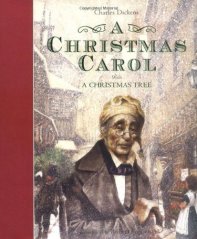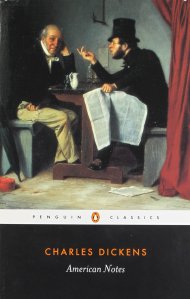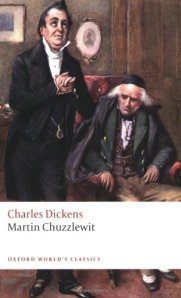 December
02
December
02
Tags
Dickens’ Love and Hate for America
On the 2nd of December 1867, Charles Dickens gave his first public reading in the United States at the Tremont Temple, Boston where he read A Christmas Carol (1843) to an American audience for the first time. This was his second and final trip to the New World – three years later, after a long illness he would die of a stroke at his house in Higham, near Rochester, Kent. Whilst the purpose for his first visit in 1842 was to collect material for a travel book, his second in 1867-68 continued his English tour of public literary readings in the States. On both occasions he was received with great acclaim. When he first arrived with his wife in 1842, “From the American point of view, Dickens was the one author they ‘claimed equally for their own’. They saw in him an ’embodied protest against what was believed to be worst in the institutions of England’. Readers in America thought of Dickens as a congenital democrat. Shortly after his arrival, The New York Herald proclaimed: ‘His mind is American – his soul is republican – his heart is democratic’, extravagant sentiments which probably seemed accurate to Dickens at the time. (Quoted in the ‘Preface’ to Letters,II I, xii). However, it turned out that Dickens found himself in a dilemma when he discovered some behaviours and attitudes of the Americans unworthy of admiration.
His impressions were recorded in a travelogue, American Notes for General Circulation (1842) and some of the episodes in his novel The Life and Adventures of Martin Chuzzlewit (1843–44). Whilst in the straight-forward, flat sounding Notes Dickens noted what he saw, in his sixth and last picaresque, semi-autobiographical Chuzzlewit, he wrote how he felt during this visit. Much like Oliver Twist, in Dickens’ eyes, Chuzzlewit was a satire, rather than an attack of the U.S., shown here as a remote, wild land, barely civilised with self-absorbed conmen. The American Republic was described as “so maimed and lame, so full of sores and ulcers, foul to the eye and almost hopeless to the sense, that her best friends turn from the loathsome creature with disgust”. Dickens also denounced the institution of slavery in North America: “Thus the stars wink upon the bloody stripes; and Liberty pulls down her cap upon her eyes, and owns oppression in its vilest aspect for her sister.” The writer had condemned slavery as early as The Pickwick Papers, placing the emancipation of the poor in England on equal footing with the abolition of the slave trade. Incidentally, during his month of lectures in NYC, Dickens persuaded 25 writers, lead by Washington Irving to take a petition to stop copyright pirating to the Congress, but the press denounced him as ungrateful for his popularity and hungry for money. The fact that America could not shake off slavery and that it did not adhere to copyright rules of any kind, was in Dickens view a shortcoming which originated in the Americans’ lack of respect for an individual’s integrity.
Dickens actually came to believe that principles were flawed because morals were bad in America, and morals were bad because manners were not sufficiently respected. He believed Americans were indiscreet and intrusive: “the American chapters of Martin Chuzzlewit are about being seen and the discomforts that steady scrutiny brings. Public dinners, receptions formal and informal, even a Boz Ball in New York turned the visiting novelist into a public exhibit. During the worst of these debacles, in Philadelphia, Dickens became a hand-shaking machine. He was kept standing for hours by five hundred total strangers. Acquainted with him in print, they felt entitled to treat his person with importunate familiarity.(…) In London, Dickens walked the streets at will. Gaping Americans taught him the meaning of dehumanization.” After the suffocating attention he received during his first American visit, Dickens probably opted for the paid public lectures where he could limit his audience exposure. Jerome Meckier noted his general distaste with American manners: “An English virtue exists for every American failing Dickens catalogued: substitute for sharp practice, good sportsmanship; for oratorical bragging, reticence and modesty; for neglect of one’s toilette, the fastidiousness that motiviated sanitary reform. The undue emphasis that Dickens placed on the American habit of spitting tobaccojuice, the ‘universal disregard for the spittoon’, can be explained by his fear that well-bred Europeans will not believe so offensive a practice could be so widespread.”
From a political point of view, Dickens “was world-famous, universally beloved, yet profoundly unhappy with social conditions in the Old World. America had been haunting his dreams: did this democratic republic coincide with his utopian fantasies? Not long after arriving, he began to realize that it could not. (…) Negative remarks in American Notes cut deeper than Mrs Trollope’s in Domestic Manners of the Americans because Dickens made them. In Martin Chuzzlewit, his treachery seemed enormous.” (Jerome Meckier, ‘Dickens Discovers America, Dickens Discovers Dickens: The First Visit Reconsidered’, The Modern Language Review, Vol. 79, No. 2, Apr.,1984). A staunch Republican in England, Dickens’ found that American democracy, which he had idealised, did not meet his expectations. Here, he feared that democracy created its own upper classes based on the aristocracy’s wealth, not standing or intelligence as in England. He also thought Americans ridiculous and conceited for their fierce national pride undermining all other nations. “Dickens felt like a husband who had deserted his marriage for a younger mistress whose beauty, enticing from afar, disappeared upon closer inspection. Dickens was proclaiming the end of his affair not only with America but with radical utopianism and all untested Romanticism.” (Jerome Meckier)
On the 9th of November 1867, Dickens sailed from Liverpool for his second American visit, which was going to be a paid reading tour of his writings. Harmony was generally preserved on both sides during this trip and it seemed that the purpose of it was primarily mercantile on Dickens’ part: he was to perform 76 readings, netting £19,000 from December to April, in spite of his already fragile health. Landing at Boston, he spent most of his time having dinners with notables as such Emerson, Longfellow, Fields. Whether it was the money that swayed him this time, or the noteworthy changes he observed during this particular visit, Dickens felt obliged to reconcile his relationship with America. At the Grand Farewell banquet hosted in his honour by the N.Y. American Press at Delmonico’s on the 18th of April 1868, Dickens delivered a pompous speech in spite of great gout pain in his foot. He admitted that he was not so arrogant as to believe that he had nothing to learn or correct in the impressions from his first visit. He elaborated on the Victorian idea that the Americans and English are essentially one people and it rested on them ‘jointly to uphold the great Anglo-Saxon race’. This of course was music to American ears and his speech ended in great cheers! On the 23th of April, he boarded his ship back to England, narrowly escaping a Federal Tax Lien against the revenue from his lecture tour.













Loved it!
LikeLike
Excellent story.
LikeLike
Pingback: And the Winners Are: My Blog Awards for 2014! | www.seanmunger.com
in other words, Dickens was a real dick.
LikeLike
Very interesting. Thank you!
LikeLike
Reblogged this on Greek Canadian Literature.
LikeLike
Reblogged this on worldtraveller70.
LikeLike